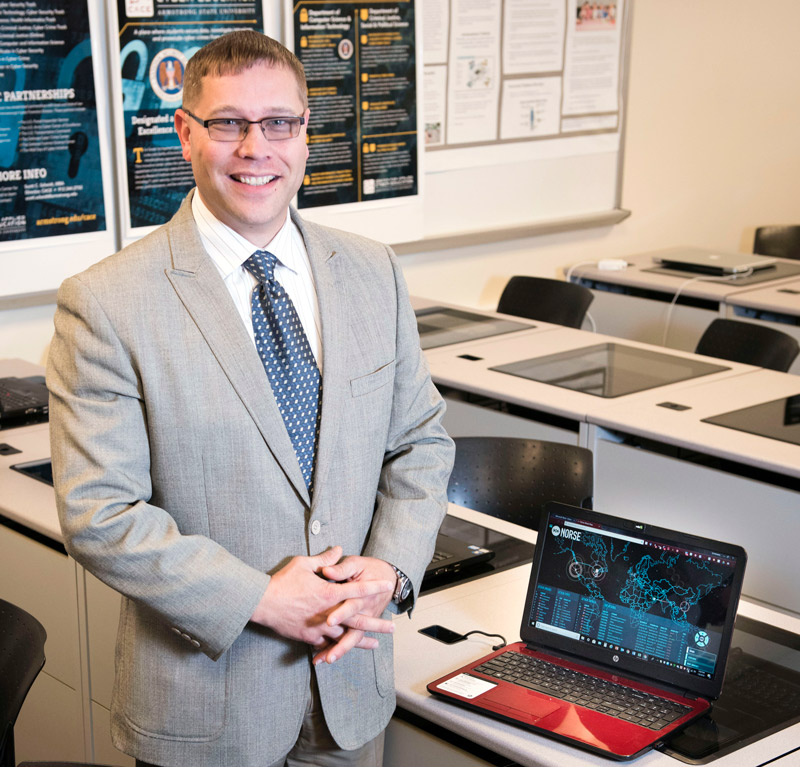Cyber Defense

The Center for Applied Cyber Education (CACE) Director Scott C. Scheidt is a 20-plus year veteran of business, military combat, intelligence operations, cyber warfare and academia, and not one to shy away from a challenge. Yet, uniting with Georgia Southern University has been nothing but an enhancement for the department located on the Armstrong Campus.
“The consolidation is a great boost for all cyber education-related programs,” said Scheidt. “And CACE programs, I believe, will be a boost for cyber concepts being incorporated into more university academic programs. It opens up our ability to provide training and academic support resources to a larger body of students, staff and faculty. It also allows us to bring unique partnerships to the Georgia Southern family and increase capability offerings back out to those larger resources.”
“The Consolidation is a great boost for all cyber education-related programs”
—Scott C. Scheidt
Joining the Armstrong Campus in 2016, Scheidt was charged with expanding CACE while leading an interdisciplinary team of faculty and staff to offer state-of-the-art cyber education. Within his first year, CACE was designated as a National Center of Academic Excellence in Cyber Defense Education by the National Security Agency and the Department of Homeland Security.
Last fall, the U.S. Department of Defense’s Cyber Crime Center recognized CACE as a Center of Digital Forensics Academic Excellence for university academic programs related to cyber crime and operational forensics capabilities. Georgia Southern is now one of only 14 institutions in the country to hold the two esteemed federal designations.
“Our students receive first-class instruction that prepares them to prevent and investigate cyber attacks, monitor and secure networks, and integrate best systems practices throughout the world,” noted Scheidt. “Our diverse cyber education programs are uniquely suited to help fill the gaps in the national cyber workforce needed to meet the demands of the 21st century.”
Each spring, Scheidt has contributed directly to cyber academic offerings by teaching a special topics class in Cyber Warfare. and has previously taught Computer Concepts and Applications and Criminal Justice Graduate Special Topics in Cyber Crime. Within the Center, he also shepherds the largest university digital forensics lab in the Southeast. As of consolidation, the lab has processed more than 600 criminal digital forensic cases that include child abductions, white collar crimes, and international drug trafficking activity for the Federal Bureau of Investigation, the Secret Service, the Drug Enforcement Administration, the Georgia Bureau of Investigation and a host of regional law enforcement partners.
With a plan for continued growth and opportunity for faculty, students and staff, Scheidt continues to support and advise on the development of new curricula and academic training capabilities with equipment like the Forensic Recovery of Evidence Device aka FRED, a sophisticated digital intelligence workstation commonplace in government agencies. CACE has also recently increased its data analytics lab capabilities and is now able to support students, faculty and staff with Social Media Analytic services and academic support to the data analytics needs of the University’s nine colleges.
The Center is an academic partner with the U.S. Army Cyber Center of Excellence and Air Force Cyber Command as well and is an invited academic advisory member to the National Defense Transportation Association. For several years, CACE has also been the academic lead for the Pentagon Cyber Integration Division for its multinational partner exercise known as Bold Quest.
Last fall, CACE, in partnership with the Coastal Regional Commission in Darien, Georgia, participated in a weeklong exercise, Bold Quest 17.2. In this exercise, military cybersecurity experts from Germany, the Netherlands, Sweden, Norway, Finland and the Texas Army National Guard operating as a Multinational Assessment Team conducted penetration testing and vulnerability analysis on the Commission’s facility systems. The goal was to expose weaknesses in the Commission’s industrial control systems so that parties involved would know how to better secure similar networks in the event of a cyber attack by threat actors, a natural disaster or a global crisis such as war.
At week’s end, the multi-national cyber operations team, and university students in the cyber program, provided reports on their discoveries and how to correct any systemic issues.
“We have a strong partner in the Department of Defense, and it’s a blessing that our students can be involved in real-world activities,” said Scheidt. “They are able to gain relevant skills, practice and knowledge before graduation. Many of them will graduate this spring with Department of Defense certifications.”
The event also provided key networking opportunities.
“This exercise was promising for further collaboration between the Defense Department and academia,” Scheidt explained. “A number of our Bold Quest partners asked if we can help them in similar capacities in their own countries. So it may be an opportunity for our faculty and staff to go with this Pentagon partnership to other countries in the near future.”

